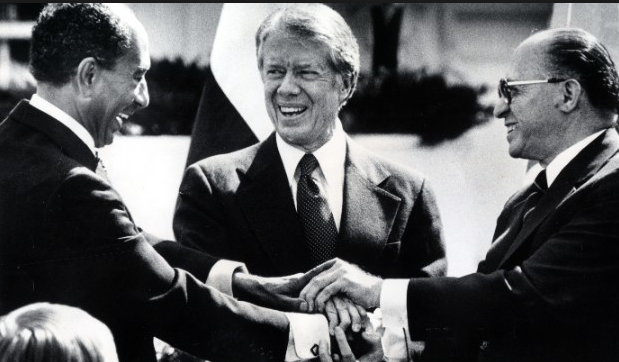The Shah of Iran was a despotic dictator, but he was also America's anti-Communist ally.
当时的伊朗国王是暴君统治者,但他也是美国反共盟友。
He was deposed by a Shiite Muslim regime in 1979.
1979年他被什叶派政权免职。
When the former Shah was allowed to receive medical treatment in the US, the new Iranian regime stormed the American Embassy in Tehran.
当这位前国王得以在美国接受治疗时,新伊朗政权下的人民冲进了美国在德黑兰的大使馆。
They took the inhabitants hostage and kept them until 1981.
他们将里面的人员扣为人质,直到1981年才释放。
Carter had better luck working for world peace.
卡特在促进世界和平上的运气还不错。
He managed to broker a peace treaty between Israel and modern Egypt.
他促成了伊朗和埃及的和平条约。

He also caused the Panama Canal Zone to be returned to the Panamanians.
他也帮助巴拿马人收回了巴拿马运河。
But Carter could not make a dent in what he rightly termed "America's malaise."
但他不能使他称为“美国低迷”的状态有所好转。
If anything, his well-meaning, but often inept, policies contributed to the malaise.
相反,他的良好意图,但是通常无力的政策还加速了这一低迷。
Not that the USSR was riding a hot streak, either.
苏联当时也没有在对抗中连连得分。
The Soviet people had long since gotten tired of paying for their nation's costly military build-up.
苏联人民已经厌倦了国家开支巨大的军备扩张。
Living in cramped, shabby apartments, working at dreary jobs, standing in long lines for scarves and scanty consumer goods.
他们住在狭窄简陋的公寓里,工作枯燥无聊,还经常需要排长队才能拿到围巾和匮乏的消费品。
They had come to see Communism as a bad joke.
于是他们把共产主义看成是一个糟糕的笑话。
Nor did Leonid Ilyich Brezhnev have any new ideas for combating the Soviet malaise.
列昂尼德·伊里奇·勃列日涅夫也没有什么新办法来解决这种苏联低迷。












